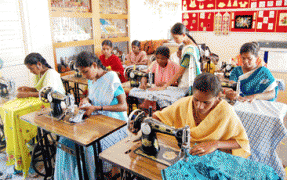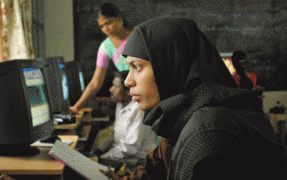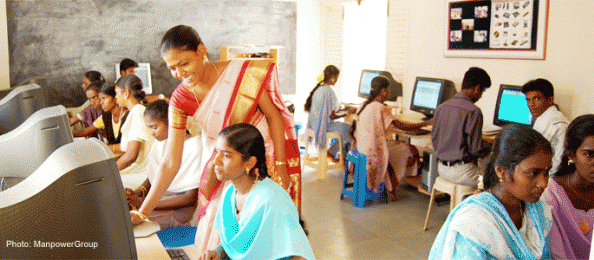Empowering Women For More Sustainable Communities
As a global organization with a presence in 82 countries and territories, Manpower Inc.’s employees, associates, clients, and candidates are naturally diverse. Diversity brings a broader range of perspectives and capabilities to our organization, as we continue to be innovative by remaining open to the ideas of all. Manpower’s core mission is to provide the best possible talent for our clients, and that means tapping into all populations and including those that have traditionally been underrepresented. Diversity is essential to maintaining our role as an expert in the changing world of work.
In many parts of the world, women are still regarded as second-class citizens. Their inferior role in some societies means they are socially, politically, and economically disadvantaged, making them vulnerable in everyday life. When communities are disempowered by events outside of their control, these inequalities are even more marked. For instance, women are often disproportionately impacted by natural disasters due to rigid cultural practices and attitudes. Those who work often hold low-paid jobs in agriculture and other industries profoundly affected by catastrophe. As the primary care-givers for the vulnerable in society – children, the elderly, and the infirm – their mobility in search of new livelihoods is limited.
The devastating Indian Ocean tsunami of 2004 is a prime example of the type of disaster that hits women the hardest. In India’s Tamil Nadu state, many families lost their primary wage earners – men – leaving many widows and orphans. Along with loss of homes, jobs in fishing and agriculture were also wiped out. Increasing the participation of women in the local workforce came with unique challenges. As in many rural Indian districts, the population observed strict social traditions and were steadfastly resistant to change. Rarely allowed to come out of their domestic arena, women’s lack of qualifications typically reduced them to grueling manual labor and poor wages. The situation was worse for women from certain religious communities and those who were widowed, divorced, or deserted faced further discrimination.

Following the disaster, vital first-response donations and aid naturally poured in, but it quickly became apparent that full recovery from the devastation would require broad systemic change. Manpower’s core expertise – connecting people to employment opportunities – allowed us to create paths to sustainable employment to enable survivors to feed their families and rebuild their communities. Manpower, in partnership with HOPE Worldwide, built two vocational centers in the towns of Nagapattinam and Tharangambadi to train those whose lives had been decimated by the tsunami and help them find new, sustainable sources of income.
In the five years since the establishment of the Manpower Vocational Training Centers (MVTCs), no cross-section of the community has been more positively impacted than the women. In order to break down the barriers that have limited women for centuries, the MVTCs leveraged Manpower’s extensive global footprint and intricate knowledge of custom and heritage, which gives us sensitivity in approaching the obstacles we face in each initiative.
Peer women volunteers were trained as field workers to motivate families to send women and girls for much-needed training; modern technology was introduced to reduce physical drudgery and increase output; and special events were scheduled to involve families in MVTC activities and sensitize them to women’s rights. In addition, counseling services were interwoven with vocational training to help women overcome trauma due to domestic violence, loss due to the tsunami, and to give them advice on sexual and reproductive issues, and on how to balance their social and economic productivity.

Since their inception, the MVTCs have helped transform the lives of local women. Almost 2,000 women have been trained in alternative employment. Of these, over 300 have been trained and employed in traditionally male-dominated industries such as masonry and mobile telephone repair, and women masons are now entrepreneurs earning equivalent salaries to their male counterparts. There has been a 26-percent increase in female enrollment compared to the first year, and 56 percent of all trainees are women compared to 30 percent when the doors first opened. Most encouragingly, the accomplishments of the MVTC female graduates are having a cascade effect among women in the surrounding communities. As they see the MVTCs graduates breaking down barriers, more women are approaching the centers to explore the opportunities the training might open for them.
Manpower’s MVTCs and similar models around the world make good economic sense, as redressing the balance between women and men in the workforce is also essential for development. According to the Organization for Economic Co-operation and Development, India’s GDP would rise by 8 percent if the ratio of female-to-male workers increased by 10 percent. And because women reinvest 90 percent of their income in their families and communities, when women are empowered, we all benefit.
At Manpower, we are committed to providing women with the best possible opportunities to reach their full potential – not only via the initiatives and programs through which we help disenfranchised women globally, but also within every level of our organization and for our talented female candidates, who we place in permanent and temporary positions with our 400,000 clients worldwide. Five of the 13 members of our executive management team are women, as is 58 percent of our leadership team worldwide. Our female leadership brings a diversity of thought and perspective, setting a pace and tone that energizes our entire organization.
Our efforts to increase the engagement of women in the workforce are not based solely on gender parity concerns, but on practical issues. We must satisfy the needs of our clients with the most talented people, as talent is becoming an ever more precious commodity. Our research shows that despite the difficult economic climate, 30 percent of employers worldwide are having difficulty finding the workers they require to fill available jobs. This talent shortage will only be exacerbated as the economy improves and as the global workforce shrinks due to aging populations. There exists the very real prospect of there not being enough qualified workers to fill the jobs that will drive growth. Therefore, it is in everybody’s best interests to tap into populations that have traditionally been underrepresented in the workforce – including women – as we have been doing for over 60 years.
This project description was originally presented in the Global Compact International Yearbook 2010.
Jeffrey A. Joerres is ManpowerGroup Chairman and CEO.
About Us // Privacy Policy // Copyright Information // Legal Disclaimer // Contact
Copyright © 2012-2018 macondo publishing GmbH. All rights reserved.
The CSR Academy is an independent learning platform of the macondo publishing group.









